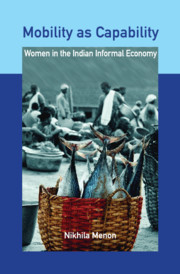Book contents
- Frontmatter
- Dedication
- Contents
- List of Tables
- List of Figures
- Preface
- 1 Transformational Mobility as Capability
- 2 Reflections on Transformational Mobility, Autonomy, and Women's Work
- 3 Women in ‘Kerala Model’: Myths and Realities
- 4 Situating Informal Work by Women in Fisheries in Kerala
- 5 ‘Measuring Mobility’ of Women: Unravelling the ‘Explicit’ and the ‘Implicit’
- 6 Pathways to Transformational Mobility of Women Workers: A Qualitative Comparative Analysis
- 7 ‘Subordinating Self’: ‘Manoeuvring Patriarchy’ among Women Workers
- 8 Self-Categorization, Group Identity, and Agency among Women Fish Vendors
- 9 Transformational Mobility: From Individual to Collective Agency of Informal Women Workers
- Bibliography
- Index
7 - ‘Subordinating Self’: ‘Manoeuvring Patriarchy’ among Women Workers
Published online by Cambridge University Press: 24 May 2020
- Frontmatter
- Dedication
- Contents
- List of Tables
- List of Figures
- Preface
- 1 Transformational Mobility as Capability
- 2 Reflections on Transformational Mobility, Autonomy, and Women's Work
- 3 Women in ‘Kerala Model’: Myths and Realities
- 4 Situating Informal Work by Women in Fisheries in Kerala
- 5 ‘Measuring Mobility’ of Women: Unravelling the ‘Explicit’ and the ‘Implicit’
- 6 Pathways to Transformational Mobility of Women Workers: A Qualitative Comparative Analysis
- 7 ‘Subordinating Self’: ‘Manoeuvring Patriarchy’ among Women Workers
- 8 Self-Categorization, Group Identity, and Agency among Women Fish Vendors
- 9 Transformational Mobility: From Individual to Collective Agency of Informal Women Workers
- Bibliography
- Index
Summary
As long as both men and women regard the subordination of half the human race to the other as ‘natural’, it is impossible to envision a society in which differences do not connote either dominance or subordination.
—Gerda Lerner (The Creation of Patriarchy, 1986)An enquiry into the lived experiences of women workers in fisheries illuminates the multiple realities and ‘unfreedoms’ shaped by caste, class, and other aspects of social structure. The lived experiences of women workers form the cornerstone of the analysis in this chapter. There are multiple layers within the social structure that interact and mould the individual actions in a given social and cultural context, which can be unearthed through personal interaction with women workers. While the mobility aspects discussed earlier looked at quantitative data, this chapter will put in perspective the everyday lives and struggles of women workers in informal fisheries work based on the interviews that I had with peeling workers.
Social phenomena are the result of multiple causes and conditions. In cultures where mobility is gendered, there are multiple conditions that can influence the mobility of women in social, community, and work spaces. Kerala is a literate society and is also considered a ‘model of development’ with respect to the status of women. However, the qualitative interviews of women workers have unravelled the mobility and autonomy aspects and put to question the ‘much applauded Kerala model of development’ on empowerment of women.
The ability to move outside the house for paid work improves women's agency and thereby well-being (Sen, 1999). Hence, mobility associated with work is a positive freedom in the sense of exposure to outside world, which improves the agency of women. However, while working outside the household is considered to be emancipatory and empowering for women, it is not necessarily so in the case of demeaning informal work. Peeling work is one such, and the in-depth interviews of peeling workers are illuminating and unravel theories that determine the behaviour of women workers both within and outside the household. The theories that emerge are pointers towards the ‘realities’ that undermine women's behaviour in a given social context, which the quantitative data often fail to capture.
- Type
- Chapter
- Information
- Mobility as CapabilityWomen in the Indian Informal Economy, pp. 118 - 135Publisher: Cambridge University PressPrint publication year: 2021



